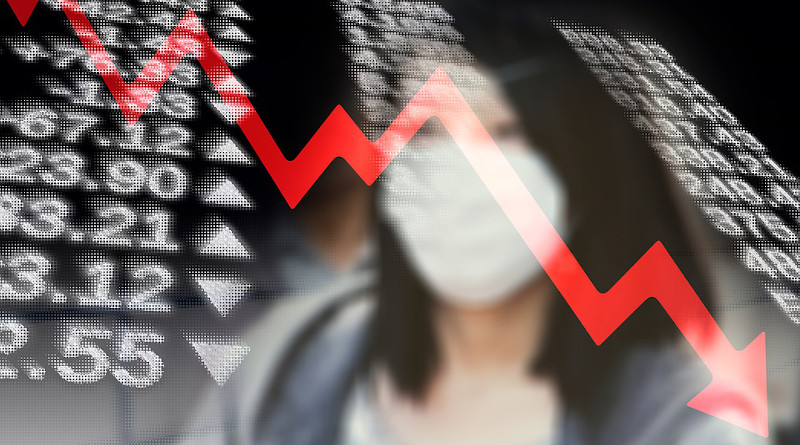The Economic Contagion Of COVID-19 – Analysis
By Dr. Hiranmoy Roy and Dr. Narendra N. Dalei
The outbreak of COVID-19 currently is considered to be the biggest threat to the global economy compared to any such threats in the past. The economic contagion is spreading as fast as disease itself.
The global pandemic of the novel coronavirus has dimmed hopes for stronger growth this year and will jeopardize 2020 global economic growth to the slowest pace since the 2008-2009 financial crisis as reported by IMF. As per IMF estimates, global GDP will fall from 2.6 % in 2019 to 1.6% in 2020.
There are three types of recession evidenced in economic history; these are financial crisis, policy and real recessions. Real recession is caused by exogenous demand and supply shocks due to events such as wars, disasters or other disturbances and push the real economy in to down turn. Policy recession is caused by tight monetary policy followed by Central Bank, which tighten financial situation, and reduces credit expansion and thus constrict the economy. Financial crisis is caused by financial imbalances. The current situation of pandemic resemblance to the real recession.
There are several recovery path may be following in the global economy. These are V-shaped, L-shaped and U-shaped. The V and U shaped recovery are demand side recovery and L shaped recovery is the supply side recovery. The V-shaped recovery is observed when real economic recovery occurs followed by real recession. In the U-shaped recovery, the recession persists impacting output to decline permanently with a gradual rebound.
L-shaped recovery is a type of recovery characterized by a steep decline in economic growth followed by slow recovery. In the past, recession caused by pandemics followed V –shaped recovery e.g. Hong Kong SARS (2002), Hong Kong flu (1968), Asian flu (1958), and Spanish flu (1918). However, it is predicted that the current pandemic may follow L –shaped recovery.
The macro financial impacts are valuation of safe assets spiked, government bonds are falling to record low, and credit spread is low., Equity valuations have fallen from recent high, and greatest strains of volatility. Variations in asset valuations is the significant uncertainty from this pandemic. The hardest hit of recession is on China, US, Italy and Spain.
Some of the instant visible impact are gold price has fallen to $48.6 per gram, price of oil fallen to $26.22 since 2001 as economic slowdown usually leads to lower energy demand, Chinese car sales fallen by -92%, estimates of income loss of airlines to the volume of $11.3 billion etc. This will affect health sector, agricultural sector and tourism sector as well.
Also there is a direct hit to consumer confidence, spending will be much less as they are in home and may also be pessimistic about longer term. There may be an indirect hit to consumers’ confidence via the wealth effect especially in advanced economies where households invest large amount on equity assets. Supply shocks will be caused by lack of production, disruption in supply chains and lay-offs may happen. The estimated global expenses due to Corona virus are $111.66 Million in UK, $25.19 Million in China, $8.3 Billion in US and $27.01 Billion in Italy.
In Indian context GDP growth has fallen to a 7 year low to 4.7 % in Q3 FY20 due to fall in manufacturing. The pharma and automobile industries are already seeing the impact. The Sensex has fallen nearly 1300 points from high. There will be drastic supply constraint of consumer durables and pharma products. Even automobile and textile product will experience the same.
Lockdown of economies will have very negative impact on oil market and as a result there will be tremendous opportunities for India to boot its revenue while household budget will see a conducive atmosphere. Inflation rate will decline due to decrease in oil price, fertilizer price and base metals etc. and unemployment will increase considerably for a longer period of time.
The most vulnerable impact of the current epidemic will be on marginal farmers, daily wage earners and poorer sections of the society as they could not work due to lock down. Therefore direct cash transfers from government will certainly help them to sustain their living while braking the chain of this epidemic. However, India will take the advantage of Japan-Korea trade war. Thus, import from China will drastically fall though trade opportunities with Japan will be escalated.
The World Bank has already declared $1 Billion to India to support its health sector. Another two packages will be announced within a couple of week, one is a social security package for urban unorganized sector workers and the other is an economic package for credit enhancement to the MSMEs -a total lending amounting to $4.2 Billion.
Countries should now focus on consumer confidence signals and need to use industry data in adjusting such insights. Business decisions should not be revolutionized by financial markets cloud. Government should prioritize health sector spending to contain the contagion curve that may confound back in the fall of 2020. Government spending should focus on direct cash disbursements to firms and households. Central bank should provide support to government not only through its fund but also by printing money if needed. No country can stand alone and hence global shock needs to be treated by global response.
- Dr. Hiranmoy Roy is working as Associate Professor & Head of Department of Economics and International Business, School of Business, University of Petroleum and Energy Studies, Dehradun, India. Email: [email protected]
- Dr. Narendra N. Dalei is working as Assistant Professor and Course Coordinator (UG-Energy Economics) of Department of Economics and International Business, School of Business, University of Petroleum and Energy Studies, Dehradun, India. Email: [email protected]

